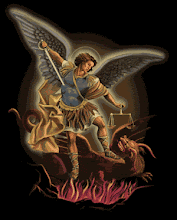Welcome to the Order of the Knights of Our Lady's Official Web Blog!
Friday, July 25, 2008
Seven Degrees of Humility
The Knight is humble, magnanimous and loyal. (Knightly Code of Honour)
Seven Degrees of Humility:
1) To acknowledge oneself contemptible;
2) To grieve on account of this;
3) To confess or admit we are so;
4) To convince our neighbor of this, that is to wish them to believe it;
5) To bear patiently that this be said of us;
6) To suffer oneself to be treated with contempt
7) To love being thus treated
- taken from St Anselm (De Simil. ci, seqq.) and St Thomas Aquinas (Humility: Secunda Secundae Partis, Q. 161)
Transubstantiation, "a long and difficult term"

From the Book, "Priest where is thy Mass, Mass where is thy Priest?", Angelus Press
Seventeen Roman Catholic priests (none of whom are formally members of the Society of Saint Pius X) explain why they celebrate the old rite of the Latin Mass instead of the New Mass. In question and answer format, these priests tell their trials and triumphs over the Novus Ordo establishment. Inspiring and often heroic examples of fidelity to their priestly vocation. Who ever would have thought that it would come to this?
Archbishop William Levada, Prefect for the Sacred Congregation for the Doctrine of the Faith, told Father Eugene Heidt that Transubstantiation is a “long and difficult term” and “we don’t use that term any more”. (p. 64)
Cremation
Please pray for the soul of the former Archbishop of Singapore, Gregory Yong who was cremated recently.
http://www.channelnewsasia.com/stories/singaporelocalnews/view/357787/1/.html
In the churches and chapels of the Society of St. Pius X, as the SSPX teach the traditional doctrine of the Catholic Church, they also keep its traditional practices.
The SSPX continue to follow the teaching of the 1917 Canon Law on burial & cremation, which expresses the constant thought of the holy Catholic Church:
Canon 1203: "The bodies of the faithful must be buried, and cremation is reprobated. If anyone has in any manner ordered his body to be cremated, it shall be unlawful to execute his wish."
Canon 1240, 5° says that "Persons who have given orders for the cremation of their bodies are deprived of ecclesiastical burial, unless they have before death given some signs of repentance."
Canon 2339 says that "Persons who, in violation of the prohibition of Canon 1240, dare to order or force the ecclesiastical burial (of those who are to be deprived of it) incur excommunication ipso facto; and persons who of their own accord give ecclesiastical burial to the above mentioned, incur an interdict from entering a church."
Summary:
- The bodies of the dead must be buried - cremation is forbidden.
- Ecclesiastical burial will be denied to those who asked for the cremation of their bodies.
In an Instruction dated June 19th 1926, the Holy Office said that the Last Sacraments could not be given to a person who is asking for cremation for itself. It adds that, entering in a society for cremation linked with Freemasonry makes this person incur the penalties for joining Freemasons, especially excommunication. Public Masses for the repose of the soul of persons who asked for cremation, are also forbidden. It comes from Canon 1241, which forbids public Masses for persons having been deprived of ecclesiastical burial. Obviously let us not forget that the Holy Church permits cremation in exceptional circumstances, as in times of epidemic, war, etc. (same Instruction)
The constant Traditional Doctrine of the Catholic Church for 1,900 years is that it condemns Cremation, because:
a) Freemasonry promotes it as a public profession of irreligion and materialism. Cremation is condemned by the Catholic Church because of its symbolism and because cremation was promoted by the enemies of the Faith for the very purpose of expressing and advancing their materialistic belief in annihilation.
b) Cremation is a barbarous custom opposed to the respect and piety that one must have for our dead, even on the natural level.
Holy Church permits cremation in exceptional circumstances, as in times of epidemic, war..
c) Conciliar modernism and the doctrine of the Catholic Church
In the new Canon Law promulgated in 1983 (n. 1176 paragraph 3), the actual authorities of the Church do not forbid anymore cremation "unless it was chosen because of reasons opposite to the Catholic doctrine" (for example, denial of the dogma of the resurrection of the bodies).
But isn't it in fact a great help given to all these associations for cremation founded all over the world now to spread this practice? These associations are inspired by Freemasonry which is now spreading cremation to fight the Catholic Church and its beliefs.
Even if the new Canon Law continues to deeply recommend the burial of the bodies, its new politics of no-condemnation favors once again the action of the enemies of the Church who, by their diabolical hatred of the creation of God, kill the fetus by abortion, the sick and the old people by euthanasia, and savagely destroy the bodies of the dead by cremation.
One can also add that cremation endangers the practice of the veneration of relics.
Let us honor our dead by burying their bodies with respect in a cemetery, and taking care of their souls by Masses, prayers and sacrifices.
http://www.sspxasia.com/Newsletters/1999/May/Is-cremation-allowed.htm



